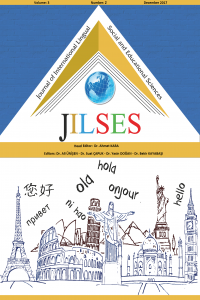Abstract
E-Commerce, which has become a
current issue with the development and proliferation of the internet, has
started to replace traditional commerce. e-commerce, whose driving force is the
internet, has many macro and micro effects on economy along with the
international commerce. One of these effects is the effect on employment. This
study, which was conducted as a documentary analyses, investigates e-commerce,
international e-commerce and their effects on employment. The study tries to
make various evaluations by analyzing the related books, reports and scientific
paper in the literature, as well as the e-commerce, international e-commerce
terms and their effects on employment. Consequently, it was concluded that the
internet and ICT based e-commerce is inevitable to affect Turkey as a global
phenomenon and trend. Turkey can also benefit from this global phenomenon and
trend by using the intensity of the internet usage of the young population it
has. At this point, international commerce can be integrated in e-commerce and
employment can be increased with new business areas, duties and titles. In
order to do this, it is necessary that Turkey strengthen the substructure in
the internet and ICT, make the necessary legal arrangements and create policies
that will provide education-labor-employment coordination.
References
- Kelleci, M. A. (2003). Bilgi Ekonomisi, İşgücü Piyasasının Temel Aktörleri ve Eşitsizlik: Eğilimler, Roller, Fırsatlar ve Riskler. Ankara: DPT Yayınları.Yayın No: DPT. 2674. Kaya, F. (2012). Dış Ticaret ve Kambiyo İşlemleri İçinde... (Ed. A. B. Başar). Eskişehir: Anadolu Üniversitesi Yayınları. Organ, A. ve Karadağ, N. C. (2011). İşletmecilik Açısından Elektronik Ticaret ve Hukuki Altyapısı.IUYD’2011 / 2(2)81-104.
Abstract
İnternet teknolojisinin gelişmesi
ve yaygınlaşmasıyla gündeme gelen elektronik ticaret (e-ticaret), giderek
geleneksel ticaretin yerini almaya başlamıştır. İtici gücü internet olan
e-ticaretin, dış ticaretle birlikte ekonomide makro ve mikro birçok etkisi söz
konusudur. Bunlardan birisi de, e-ticaretin istihdama etkisidir. Dokümanter
analiz şeklinde yürütülen bu çalışmada, e- ticaret ile e-dış ticaret kavramları
ve bunların istihdama etkileri ele alınmıştır. Çalışmada, literatürde yer alan
ilgili kitap, rapor ve bilimsel yazılar analiz edilerek, e- ticaret ile e-dış
ticaret kavramları ve bunların istihdama etkileri analiz edilerek, çeşitli
değerlendirmelerde bulunulmuştur.Değerlendirmelerde, internet ve BİT tabanlı
e-ticaretin küresel bir olgu ve trend olarak Türkiye’yi de etkilemesinin
kaçınılmaz olduğu sonucuna varılmıştır. Türkiye, sahip olduğu genç nüfusun
internet kullanım yoğunluğu da kullanarak, bu küresel olgu ve trendden avantaj
sağlayabilir. Bu noktada, dış ticaret e-ticarete entegre edilerek, yeni iş alanları,
görev ve unvanlarla istihdam artışı sağlanabilir.Bunun için öncelikle internet
ve BİT konularında alt yapıyı güçlendirmesi, konuyla ilgili gerekli yasal
düzenlemeleri yapması ve eğitim-işgücü-istihdam eşgüdümünü sağlayacak politikalar
üretmesi gerektiği değerlendirilmiştir.
Keywords
References
- Kelleci, M. A. (2003). Bilgi Ekonomisi, İşgücü Piyasasının Temel Aktörleri ve Eşitsizlik: Eğilimler, Roller, Fırsatlar ve Riskler. Ankara: DPT Yayınları.Yayın No: DPT. 2674. Kaya, F. (2012). Dış Ticaret ve Kambiyo İşlemleri İçinde... (Ed. A. B. Başar). Eskişehir: Anadolu Üniversitesi Yayınları. Organ, A. ve Karadağ, N. C. (2011). İşletmecilik Açısından Elektronik Ticaret ve Hukuki Altyapısı.IUYD’2011 / 2(2)81-104.
Details
| Journal Section | Research Article |
|---|---|
| Authors | |
| Publication Date | December 25, 2017 |
| Submission Date | October 12, 2017 |
| Acceptance Date | October 30, 2017 |
| Published in Issue | Year 2017 Volume: 3 Issue: 2 |

This work is licensed under a Creative Commons Attribution-NonCommercial-ShareAlike 4.0 International License.

